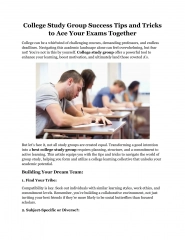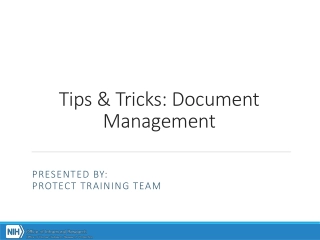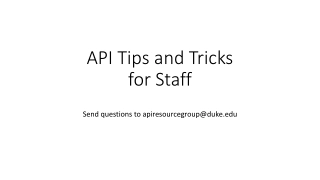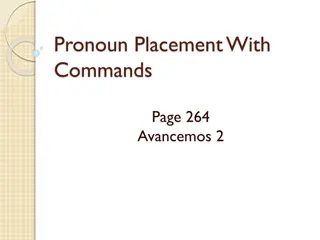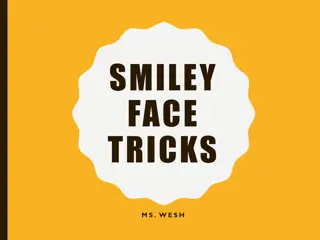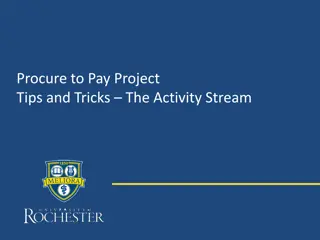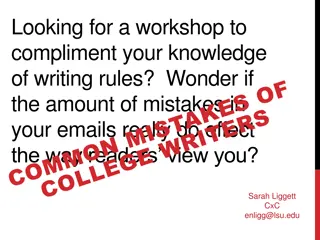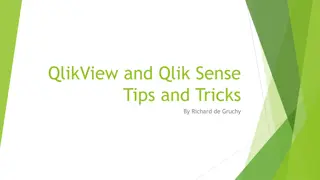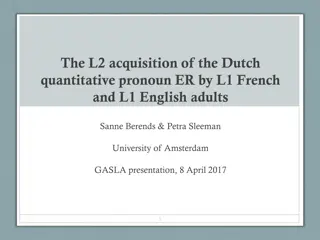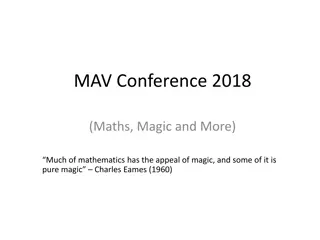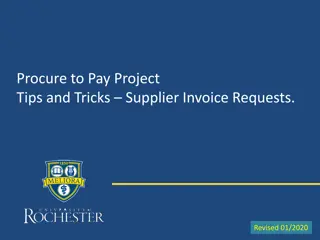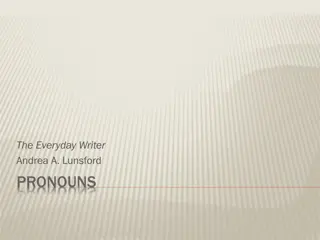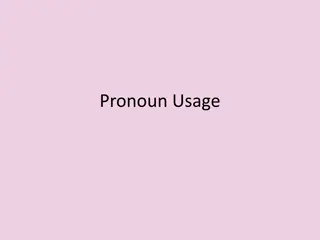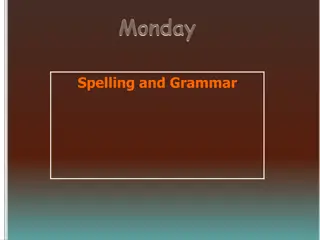Mastering Pronoun Case: Essential Tips and Tricks
Learn about the four cases of pronouns in English - subjective, objective, reflexive, and possessive. Discover six essential tips and tricks to handle pronoun usage effectively, from using "who" and "whom" correctly to understanding when to remove or substitute information. Improve your grammar skills and confidently navigate any pronoun situation that arises.
Download Presentation

Please find below an Image/Link to download the presentation.
The content on the website is provided AS IS for your information and personal use only. It may not be sold, licensed, or shared on other websites without obtaining consent from the author. Download presentation by click this link. If you encounter any issues during the download, it is possible that the publisher has removed the file from their server.
E N D
Presentation Transcript
Pronoun Case Adapted from Real Good Grammar, Too by Mamie Web Hixon
Knock, knock. Who s there? To. To who? To whom!
What is Pronoun Case? What is Pronoun Case? English has four cases of pronouns: subjective, objective, reflexive, and possessive. Most of the time, we use pronouns correctly without thinking about which case we are using. However, certain situations often trip writers up. Once you learn these six tricks of the trade, you ll be able to handle any pronoun situation that arises.
Subjective Objective Reflexive Possessive I Me Myself Mine She Her Herself Her(s) He His Himself Him They Them Their(s) Themselves We Us Our(s) Ourselves --- Who Whose Whom
TIP/TRICK 1: TIP/TRICK 1: Who for for whom. whom. Who versus versus Whom. Whom. Substitute Substitute he he for for who who and and him him Who/whoever = he, they, she He is the candidate who should win. (He should win.) Give the money to whoeverwins. (He wins.) Whom/whomever = him, them, her He is a candidate whom we can trust. (We can trust him.) Give the money to whomever the team chooses. (The team chooses him.)
TIP/TRICK 2: Remove extra information. TIP/TRICK 2: Remove extra information. With multiple parts of the sentence in which the pronoun is functioning, ignore/delete the word and and the other person: You and I figured out the answer. The professor asked Imani and me to read the text. Everyone except Nelly and me attended the meeting. With other pronouns accompanying nouns, ignore/delete the noun(s): We grammar nerds must stick together. The instructor told us students to sit down.
TIP/TRICK 3: TIP/TRICK 3:Substitute pronoun after pronoun after between Substitute we between. Which one works? . Which one works? we and and us us for your any for your any The debate was between him and his opponent. The debate was between we. OR The debate was between us. The WE-group (subject pronouns): I, he, she, we, they, who The US-group (object pronouns): me, him, her, us, them, whom An argument broke out between her and me. An argument broke out between we. OR An argument broke out between us.
TIP/TRICK 4: Use a possessive pronoun TIP/TRICK 4: Use a possessive pronoun preceding a gerund. preceding a gerund. My going to the store was essential. My biking improved my health. Gerund = an -ing verb acting as a noun. Substitute a noun for your gerund: My trip to the store. You wouldn t say, Me trip to the store, so don t say, Me going to the store either.
TIP/TRICK 5: In comparisons, add or mentally TIP/TRICK 5: In comparisons, add or mentally insert the missing/elliptical words. insert the missing/elliptical words. My classmates are much older than (I / me). My brother eats more than (I / me). Carlos likes Tracy more than (I / me). Try inserting the implied words: My classmates are much older than Iam. My brother eats more than Ido. Carlos likes Tracy more than Ido. Or: Carlos likes Tracy more than he likes me.
TIP/TRICK 6: Use the TIP/TRICK 6: Use the We pronouns) after pronouns) after Be We Group (subject Group (subject Be- -verbs. verbs. The winner of the contest is she. Some linking verbs are is, am, are, was, and were. This trick works because the linking verb acts as an equal sign. The winner of the contest is she means the same thing as She is the winner of the contest. You wouldn t say, Her is the winner of the contest. CALLER: May I speak with Olivia? OLIVIA: This is she.



